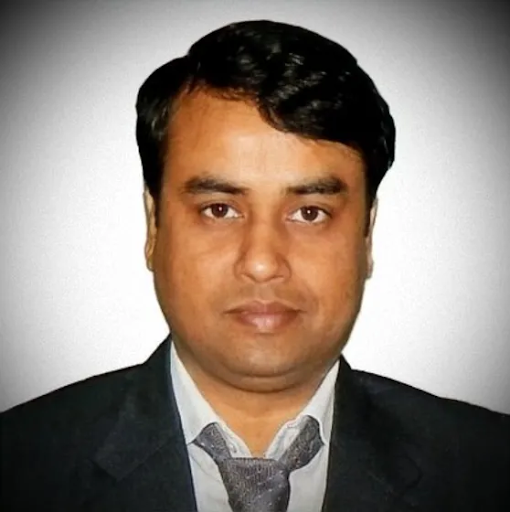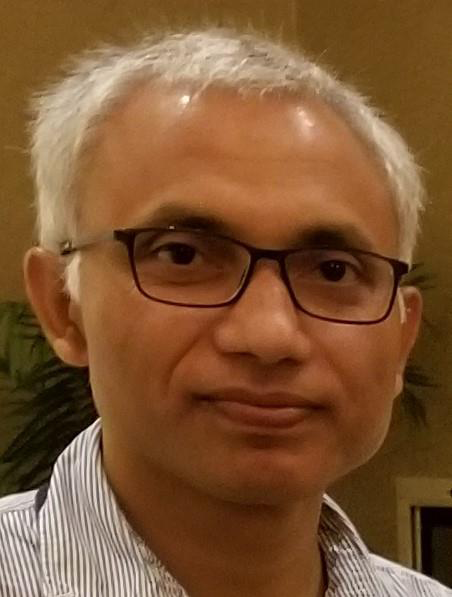1. Transforming Technical Education: Practical Uses of AI, MR, Gamification, cloud and IoT for Personalized and Scalable Learning; 2. CASE: Traffic and energy load balancing in cooperative dual-powered green cellular networks
Talk 1: Transforming Technical Education: Practical Uses of AI, MR, Gamification, cloud and IoT for Personalized and Scalable Learning
Cutting-edge technologies like AI-ML, AR/VR/MR, gamification, and the metaverse can revolutionize technical education through personalized training and simulation. AI-ML analyzes individual learning patterns to tailor educational content. AR/VR/MR provides hands-on experience. Gamification makes learning engaging and motivating. The metaverse offers collaborative learning and exploration. By combining these technologies, educators can create dynamic learning experiences that cater to diverse learning styles and foster innovation. AI-driven analytics can continuously refine and improve educational content and delivery, ensuring that technical education remains relevant and effective.
Talk 2: Power consumption in cellular wireless communication base stations is a significant cost factor for service providers. Further, it significantly adds to the global carbon footprint. To this end, ambient-powered wireless base stations are being explored. In this presentation,
we will present the case of networked cellular base stations equipped with solar/ambient energy harvesting capability and connected to the power grid for their uninterrupted operation. Since ambient energy availability and cell traffic are stochastic processes, we demonstrate the need for inter-base station cooperation for dealing with these doubly stochastic processes at potentially reduced grid power consumption costs. Under such an inter-base station cooperative scenario, we investigate the energy harvesting and storage capacity and operation optimization strategies for operator revenue maximization and/or green cellular operation. Beyond the CAPEX optimization, implementing the proposed strategies requires only software intervention at the Radio Network Controller or Remote Radio Units.
This event is primarily in-person. However, remote participation is available via Zoom for those unable to attend physically. The Zoom meeting link is as follows:
Join Zoom Meeting
https://njit-edu.zoom.us/j/
Meeting ID: 565 319 8906
Passcode: 385526
Date and Time
Location
Hosts
Registration
-
 Add Event to Calendar
Add Event to Calendar
- 154 Summit Street, Newark, NJ 07102
- NJIT
- Newark, New Jersey
- United States 07102
- Building: Elect & Comp Eng Building
- Room Number: ECEC 202
- Click here for Map
- Contact Event Hosts
-
Dr. Ajay K. Poddar, Email:akpoddar@ieee.org
Dr. Edip Niver, email: edip.niver@njit.edu
Dr. Durga Misra, Email: dmisra@ieee.org
Dr. Anisha M. Apte, Email: anisha_apte@ieee.org
- Co-sponsored by IEEE North Jersey Section
Speakers
Vishal Kumar of Ocean2Sand LLC
Transforming Tech Education: Practical Uses of AI, MR, Gamification, cloud and IoT for Personalized & Scalable Learning
Technology & Domains:
High-risk and heavy motor industries, educational institutes, finance, and underground drilling industries can modernize their training, simulation, and advertisement practices by integrating AR/VR, metaverse, AI, gamification, IoT, Web3, and cloud technologies. AR/VR can overlay real-time data onto machinery, VR can offer realistic training scenarios, metaverse can create virtual training spaces, AI can tailor training programs, gamification can increase engagement, IoT can collect real-time data, Web3 can enable decentralized training platforms, and cloud can provide scalable infrastructure. These technologies lead to safer operations, more efficient workflows, and enhanced learning experiences.
Cutting-edge technologies like AI-ML, AR/VR/MR, gamification, and the metaverse can revolutionize technical education through personalized training and simulation. AI-ML analyzes individual learning patterns to tailor educational content. AR/VR/MR provides hands-on experience. Gamification makes learning engaging and motivating. The metaverse offers collaborative learning and exploration. By combining these technologies, educators can create dynamic learning experiences that cater to diverse learning styles and foster innovation. AI-driven analytics can continuously refine and improve educational content and delivery, ensuring that technical education remains relevant and effective.
AR/VR/MR platforms can replicate real-world environments where ground radar systems operate. This includes simulating terrain, weather conditions, and different scenarios where ground radar is used, such as air traffic control, weather monitoring, or military applications. Virtual reality can transport users to space exploration missions, allowing them to experience the challenges and excitement of space travel. These simulations can include spacewalks, planetary landings, and interactions with spacecraft and extraterrestrial environments, providing valuable insights into space missions. Aerospace engineers can use virtual reality to visualize and interact with 3D models of aircraft and spacecraft designs. This allows for collaborative design reviews, ergonomic evaluations, and testing of different configurations before physical prototypes are built, reducing development time and costs. R/VR/MR technology can simulate mission control environments for space missions, allowing trainees to practice coordinating spacecraft operations, monitoring telemetry data, and making real-time decisions in response to simulated scenarios. This helps prepare mission control personnel for space missions' dynamic and high-pressure nature.
Biography:
Name: Vishal Kumar
CTO | Co-Founder - Ocean2Sand LLC
Chief Software Architect | Product Manager | Research Scientist - Digital Control Inc.
Founder - MetaTel | Poddar Apps
Engineering Manager | Chief Engineer - Synechron
Linkedin: https://www.linkedin.com/in/vishalkumarpoddar/
Email: tovpoddar@gmail.com
Phone: +919881461355
Industry Experience: 20+ years
Email: tovpoddar@gmail.com
Address: Pune, India
Email:
Address:2 River Drive, , Elmwood Park, United States, 07407
Prof. Swades De of Indian Institute of Technology Delhi, Delhi
CASE: Traffic and energy load balancing in cooperative dual-powered green cellular networks
Power consumption in cellular wireless communication base stations is a significant cost factor for the service providers. Further, it significantly adds to the global carbon footprint. To this end, ambient-powered wireless base stations are being explored. In this presentation, we will present the case of networked cellular base stations equipped with solar/ambient energy harvesting capability and connected to the power grid for their uninterrupted operation. Since ambient energy availability and cell traffic are stochastic processes, we demonstrate the need for inter-base station cooperation to deal with these doubly stochastic processes and potentially reduce grid power consumption costs. Under such an inter-base station cooperative scenario, we investigate the energy harvesting and storage capacity and operation optimization strategies for operator revenue maximization and/or green cellular operation. Beyond the CAPEX optimization,
Implementing the proposed strategies requires only software intervention at the Radio Network Controller or Remote Radio Units.
Biography:
Swades De received the B.Tech. Degree in Radiophysics and Electronics from the University of Calcutta in 1993, the M.Tech. Degree in Optoelectronics and Optical communication from IIT Delhi in 1998 and the Ph.D. degree in Electrical Engineering from the State University of
New York at Buffalo in 2004. Dr. De is currently a Professor (Higher Academic Grade) with the Department of Electrical Engineering and an Institute Chair Professor at IIT Delhi. Before moving to IIT Delhi in 2007, he was a Tenure-Track Assistant Professor with the Department of ECE, New Jersey Institute of Technology, Newark, NJ, USA, from 2004–2007. He worked as an ERCIM Post-doctoral Researcher at ISTI-CNR, Pisa, Italy (2004), and has nearly five years of industry experience in India on telecom hardware and software development from 1993–1997, 1999. His research interests are broadly in communication networks, emphasizing performance modeling and analysis. Current directions include resource allocation, energy harvesting, wireless energy transfer, energy-sustainable and green communications, spectrum sharing, smart grid networks, and IoT communications. Published 113 journal and 127 conference papers, 7 book chapters, 1 edited book, 5 Indian/US/EU/WO patents (which have been monetized), and filed 8 Indian patents and 6 US/EU patents. More details of Dr. De's research can be noted from his website at: https://web.iitd.ac.in/~swadesd/.
Among numerous awards and distinctions during his professional career, the recent ones include K L Chopra Research Award at IIT Delhi for excellence in applied research (2024), IEEE VTS Distinguished Lecturer (2022-2024), Abdul Kalam Technology Innovation National Fellowship (2021-2024), Best paper award (NCC, 2021), Om Prakash Bhasin award for Science and Technology (2019), IETE Ram Lal Wadhwa Award (2019), IEEE Wireless Communications Letters Best Editor Award (2022), IEEE Communications Letters Exemplary Editor Award (2018, 2021, 2022), IEEE Communications Letters Exemplary Reviewer Award (2015). Dr. De is a fellow of the Indian National Academy of Engineering (INAE), National Academy of Sciences, India (NASI), and Indian National Science Academy (INSA).
Email:
Address:Department of Electrical Engineering , Indian Institute of Technology, Delhi, Delhi, India, 110016
Agenda
Event Time: 6:00 PM to 8:00 PM
ECEC 202
6:00 PM Refreshments & Networking
6:10 PM Welcome and Opening Remarks by Dr. Misra, Chair CASS/EDS and AP/MTT Chapters, Professor and Chair ECE Dept
6:20 PM Talk by Vishal Kumar, CTO | Ocean2Sand LLC.
7:15 PM Talk by Swades De, Professor of Electrical Engineering, IIT Delhi, India
This event is primarily in-person. However, remote participation is available via Zoom for those unable to attend physically. The Zoom meeting link is as follows:
Join Zoom Meeting
https://njit-edu.zoom.us/j/
Meeting ID: 565 319 8906
Passcode: 385526
All Welcome: There is no fee/charge for attending an IEEE technical seminar. You don't have to be an IEEE Member to attend. Refreshments are free for all attendees. Please invite your friends and colleagues to take advantage of this Lecture.




